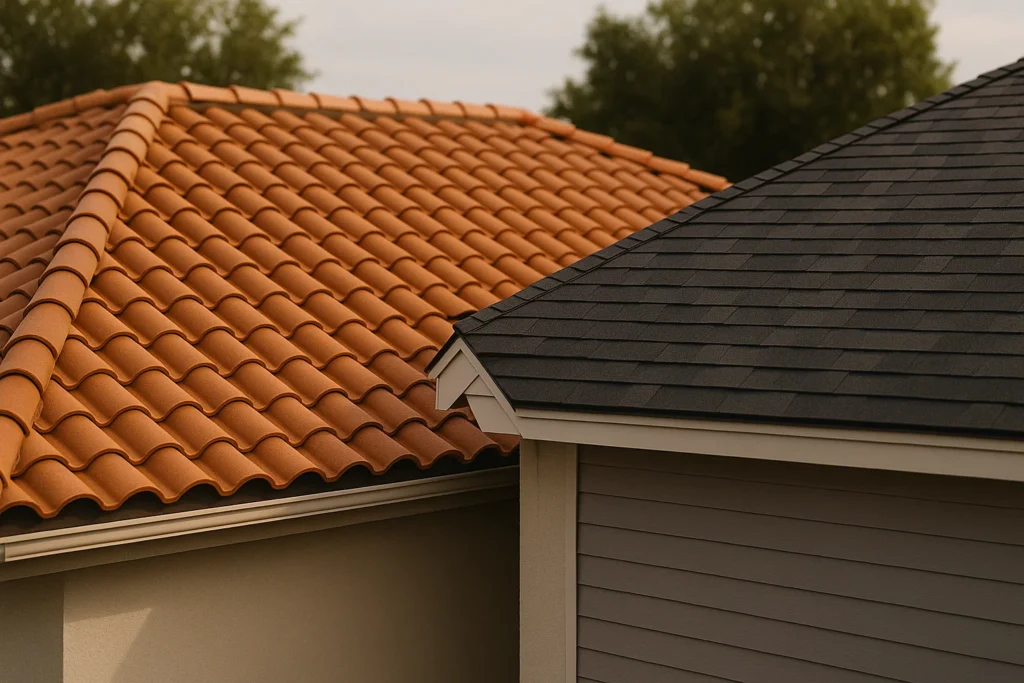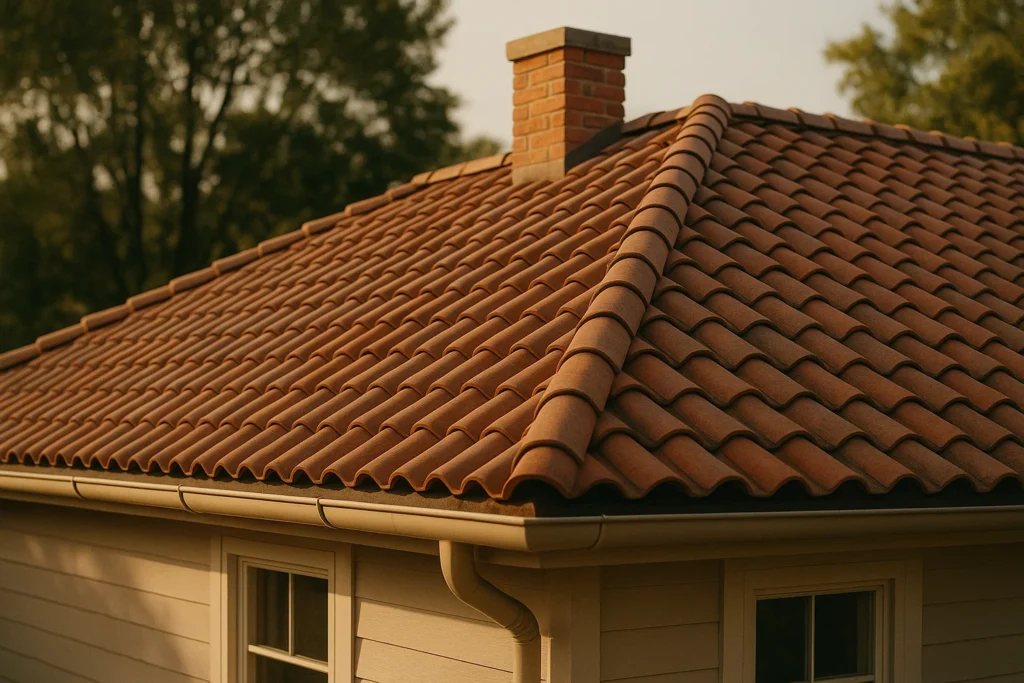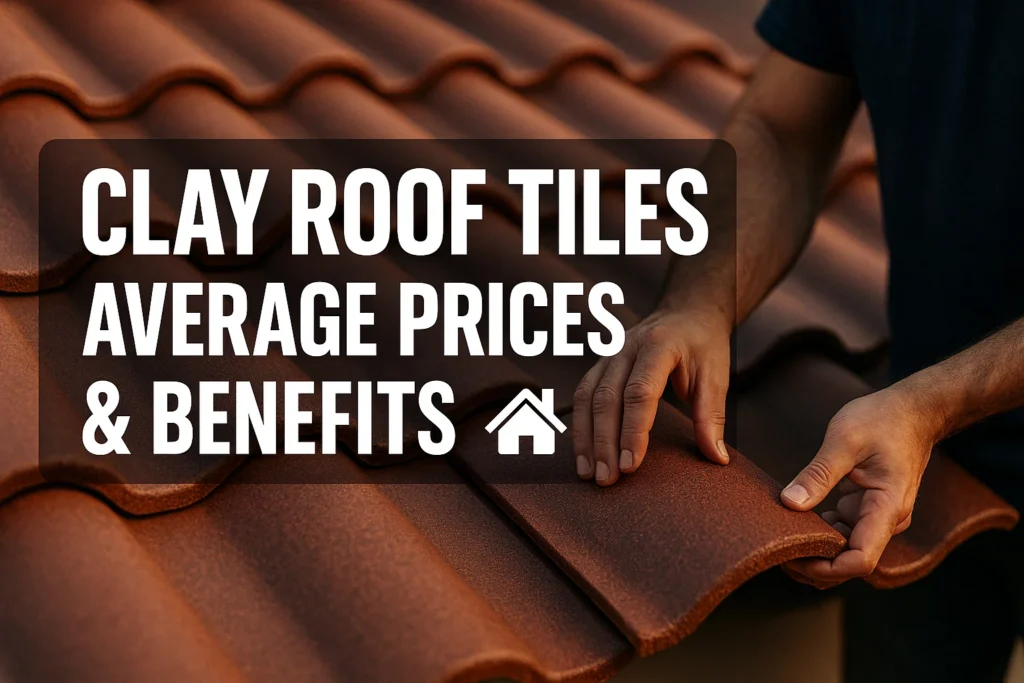Clay roof tiles can be described as a traditional roofing option known to be durable, beautiful, and long-lasting. They have been in use over the centuries and continue to be popular on both roof residential and commercial buildings because of their unique appearance and good performance. But when we discuss the clay roof tiles cost in 2025, then it is between $11 to $22 per square foot. This guide will give you an understanding of the cost of clay roof tiles, the advantages and factors to consider when it comes to clay tile roofs.
Why Choose Clay Tile Roofing for Your Home?
Clay tile roofing provides customers with an unmatched combination of beauty, durability and energy efficiency. The tiles are created out of natural clay and have a life span of decades and usually last more than 50 years and even 100 years with proper maintenance. They are well built and can withstand extreme weather conditions like heavy rainfall, strong winds, hail and even fires.
Clay tiles are also resistant to fire and pests which is an added protection to your home. They are produced of natural, recyclable materials, which makes them environmentally friendly. Clay tiles are also low on the maintenance scale since they are resistant to mold, rot and insects. These advantages make the clay tile roofing an outstanding long-term investment that not only increases the safety and comfort of your house but also its value and curb appeal.
Average Prices of Clay Roof Tiles in 2025
Clay roof tiles are deemed as a high-end roofing material and prices change depending on the type of tile, the size of the roof, the complexity and location. On average, you can expect:
- Price in square feet: $11 to $22
- Per 100 square foot (one roofing square): $1100 to $ 2200
- Average price of a 2, 000 sq ft roof: $ 22, 000 to $44, 000

Cost Factors
A number of factors determine the final cost
Tile Style: Styles such as the Mission, French, Spanish and the Interlocking have various prices.
Roof Size and Shape: The bigger or complicated the roof, the higher the costs of labor and materials.
Labor: Professional installation accounts for about 40% of overall expenses.
| Roof Size (sq ft) | Estimated Cost Range |
| 1,000 | $11,000 – $22,000 |
| 1,500 | $16,500 – $33,000 |
| 2,000 | $22,000 – $44,000 |
| 2,500 | $27,500 – $55,000 |
Benefits of Clay Roof Tiles
Durability and Long Life
Clay roof tiles are infamous in their exceptional durability rate and have the capability of serving a span of 50 to 100 years and beyond with due maintenance. They are tough against excessive weather disasters including excessive rain, strong winds, hailstorms, and overexposure to the sun. Moreover, clay tiles are fire-proof and neither rot nor become subject to insect attacks thus contributing to the unchanging reliability of roof protection.
Energy efficiency and thermal insulation
Clay tiles also offer high insulation properties that help maintain the right indoor temperatures, making it feel a lot cooler during the summer season and warmer on the colder days. This in-built thermoregulation saves unnecessary heating or cooling and leads to lowered utility expenses and increased comfort during heat-waves and winters.
Aesthetic Appeal
Clay roof tiles are offered in earthy tones, such as terracotta red and brown, and bring architectural interest to the house. It is specially offered in Mediterranean, Spanish, and Southwestern styles. Their vintage style gives it high curb appeal, which can raise a home value and score it a sleek, elegant affect.
Low Maintenance
Clay tile roofing does not need much maintenance provision as compared to other forms of roofing. They do not support the growth of mold or mildew or moss and individual tiles can be easily replaced in a case of breakage. Clay tiles can be made entirely of natural, recyclable materials, therefore, are ecologically sensitive roof coverings, helping to achieve matters of sustainable construction.
Intuitiveness, Flexibility
Modern clay tiles arrive in different shapes and sizes thus they are useable on different roof designs that may have uphill or curved designs. They can also be shaped to go with low pitched roofs where other materials could be useless, giving it flexibility to adapt to the various types of architectural requirements.
Clay roof tiles are an elegant and aesthetically appealing composite of durability, energy costs, and sustainability that put it in a favorable position as a cost-effective roofing choice as well.
Clay Tile Roofing vs. Other Roofing Materials
Clay tile roofing stands out from other roofing materials for several important reasons.
| Feature | Clay Tile Roofing | Asphalt Shingles | Metal Roofing | Concrete Tiles |
| Lifespan | 50 to 100+ years | 15 to 30 years | 40 to 70 years | 40 to 60 years |
| Durability | Highly durable, fire-resistant, withstands harsh weather | Moderate durability, prone to wind and hail damage | Very durable, resistant to corrosion and fire | Durable but may crack under impact |
| Weight | Heavy (requires reinforced framing) | Lightweight | Lightweight | Heavier than asphalt but lighter than clay |
| Energy Efficiency | Excellent natural insulation, reduces heating/cooling costs | Moderate insulation | Poor insulation, may increase energy costs | Good insulation, thermal mass benefits |
| Aesthetic Appeal | Timeless, classic, earthy tones | Wide color range but less distinctive | Modern and sleek, limited colors | Can mimic clay or other materials |
| Cost | Higher upfront cost | Low upfront cost | Moderate to high upfront cost | Moderate upfront cost |
| Maintenance | Low maintenance, easy tile replacement | Requires more frequent repairs | Low maintenance | Low maintenance |
| Environmental Impact | Natural, recyclable materials | Petroleum-based, less eco-friendly | Recyclable, but high energy manufacturing | Natural materials, recyclable |
Maintenance and Care for Clay Tile Roofs
Proper care should be taken to ensure that the clay tile roofs are not only in great condition and ensure they stay longer. These are the most important maintenance practices and caring tips:
Schedule Regular Professional Inspections
Get a professional roofing contractor to check your roof at least one time yearly, either in spring or in fall. They will see cracked, chipped or displaced tiles, and evaluate of the roofing condition.
Remove Debris Regularly
Removes leaves, tree limbs, dirt and other debris on the roof surface, valleys, and gutters. This prevents moisture buildup which can destroy the roof and delivers perfect water drainage.
Clean Algae and Moss Carefully

Clay tiles are prone to the moss, algae or lichen which may grow on them in shady or high-humidity locations. Cleaning should be done with soft detergent solutions and low-pressure washers or gentle cleaning. Avoid using high-pressure cleaning because it will crack tiles. You may want to consider the use of an algae resistant sealant usually advised by roofing experts.
Replace Broken Tiles Promptly
Call in replacement of cracked or broken tiles in case you see any such signs, as leaks may be the cause of new cracks or breakages.
Protect Flashings and Roof Joints
Inspections should include checking the roof flashings and the joints as they are among the places where the roof can leak and subsequently bring about damage.
Avoid Walking on the Roof
Clay tiles are Liable to break when trodden upon. Use roof walkways or employ experts to inspect and repair in order to reduce the risk of damages.
Clean Gutter and Downspouts
Clean the gutter and downspout frequently and think about using mesh guards to keep debris out, which causes water overflow to the roof.
Conclusion
Clay tile roof is a stunning and eco-friendly method of roofing which can really add aesthetic value as well as help in increasing the value of your house. They are long lasting, can withstand poorly constructed weather, and require very little maintenance making them an economical investment with time. Clay tiles come in many colors and styles that provide versatility in design choices so that they can be used to match a wide range of architectural styles. With easy care and maintenance measures, homeowners can easily maintain their clay tile roofs long after they have installed the roofing in their homes.
FAQs
Clay tile roofs have low maintenance. They should be routinely checked and cleaned with care to avoid damage.
It is easy to replace individual tiles thereby not necessitating the replacement of the whole roof.
Clay tiles have moderate insulating abilities and they regulate the interior temperatures and save on energy expenditure.
Clay roofing is also more expensive up front than asphalt shingles but has better durability and cost less in maintenance, and therefore, a good investment.
Clay tiles can withstand heavy rain, high winds, hail, and fire, which have made it applicable in most climatic conditions.
Clay tiles are typically frail, and so should not be walked on. Hire professional to do inspections and repairs to avoid destroying tiles.







